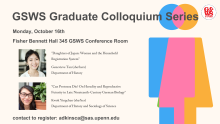Genevieve Tan (she/hers)
"Daughters of Japan: Women and the Household Registration System"
[Abstract Forthcoming]
Yingchen Kwok (she/hers)
"Can Protozoa Die? On Heredity and Reproductive Futurity in Late Nineteenth-Century German Biology"
In 1881, the German zoologist August Weismann proposed that protozoans were immortal, and natural death was a secondarily acquired adaptation that only emerged in multicellular life. I argue that these unorthodox beliefs were essential to his formulation of one of the first comprehensive biological accounts of heredity, long before the possibility of knowledge about any concrete mechanism for the transmission of hereditary traits. Both Weismann’s faith in the existence of a stable hereditary substance that could pass unchanged across generations and his conception of natural death depended on the distinction he drew between germ and somatic cells, which I show was founded on a binary sexual division of labor that lay at the core of nineteenth-century German identity. Weismann was soon challenged by Alexander Götte, who advanced a similarly unintuitive claim that reproduction was the universal cause of natural death, a relationship that had been inherited from the lowest lifeforms and could only be discerned by investigating the phenomenon in its “simplest, most originary form” rather than using death in higher organisms as the baseline. Drawing on Michelle Murphy’s concept of the phantasmagram, I argue that scientific debates over the evolutionary meaning of reproduction and death served as focal points to clarify and negotiate broader sociopolitical anxieties in a manner that was seemingly safe, objective, and controllable. Despite their disagreements, both Weismann and Götte relied on the figure of the germ cell as a symbolic conduit of their respective visions of social order, reinforcing the idea that biological reproduction (conceived in a strictly cisheterosexual frame) was the purpose of life, and its primary function was the preservation of that order.
Register by emailing GSWS Graduate Associate Caitlin Adkins [adkinsca@sas.upenn.edu]

 The Program in Gender, Sexuality, and Women’s Studies
The Program in Gender, Sexuality, and Women’s Studies